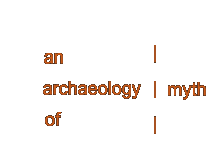
We are awash in the notion that we have gotten beyond myth. But mythless as we want to be, we still tell stories.
 |
|
|
It is not easy to see myth at work or to explain myth to those who take pride in their illusion of mythlessness. We have evolved a sense of ordinary reality that instructs us on how to get on with our lives as if we had no need of myth. There is too little time, too much to learn, too many skills to master, to be concerned about myth. But it is myth that we need to transport us from the reality of everydayness into a real human world that mythic imagination and mythic sensibilities make possible. Myth, for those under the influence of a culture soaked in notions of mythlessness, begins in story. "[O]ur capacity to render experience in terms of narrative is not just child's play but an instrument for making meaning that dominates much of life in culture—from soliloquies at bedtime to the weighing of testimony in our legal system." [Jerome Bruner, Acts of Meaning 97 (Cambridge: Harvard University Press, 1990)] Sam Keen and Anne Valley-Fox remind us that we lose some of this story intelligence with the "emergence of machines, . . . anonymity, money, mass media, standardization, [and] automation. . . ." They contend that we are now so "homogenized into business, education, politics and dissipated in the media" that we suffer the loss of mythic knowing. [Sam Keen & Anne Valley-Fox, Your Mythic Journey: Finding Meaning in Your Life Through Writing and Storytelling 1 Los Angeles: Jeremy P. Tarcher, 1989)] Alasdair MacIntyre tells a fable describing the modern state of moral discourse that might also explain the place of myth in modern life:
MacIntyre, disturbed by the condition he has diagnosed in his fable asks,
"How could this be so?" [Alasdair MacIntyre,
After Virtue 1 (Notre Dame: University of Notre Dame, 1981)] |